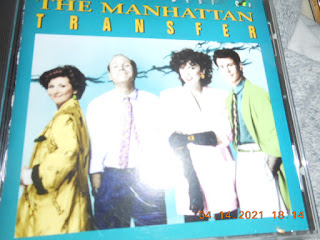It's a two-for-one thing on this week's Reminiscings of Youth article and the first one for one of my favourite bands, The Manhattan Transfer. In fact, it's so much one of my favourite bands that for a person like me who doesn't really attend concerts, I actually paid out the yen to get the ticket to see them with my own eyes at The Blue Note in Tokyo, some time in the last few years of my life in Japan.
It was a packed house and as has been the case with a number of other acts over the decades such as The Ventures and Carpenters, The Manhattan Transfer has been a beloved musical guest in Japan. I've known about Tim Hauser, Alan Paul, Laurel Masse (to be replaced by Cheryl Bentyne), and Janis Siegel since I was an elementary school student, and to see Hauser, Paul, Masse and Bentyne a mere four or five metres away from me on the stage at last performing their biggest and most recognizable hits was a singular thrill. I remember one middle-aged fan even closer in front jumping to her feet as either Siegel or Bentyne sang right to her face. Hygiene issues aside, I'm sure that the fan's life was fulfilled. For me, it was also poignant because Hauser would pass away a few years later at the age of 72.
Although I did pick up their "Bodies & Souls" album from 1983 when I was in university, I really didn't go onto the purchasing binge for their discography until my time in Japan. I was in my jazz phase then so being a regular at the various CD stores, I started snatching up a number of their early albums including the two BEST compilations that you see at the top and bottom. The wonderful thing about The Transfer was their ability to tackle not only vocalese jazz, but also urban contemporary, Latin and doo-wop (and others). Their vocal stylings were truly magnificent instruments on their own and although a lot of their songs were covers of earlier numbers, they really made them their own.
One such example is "Tuxedo Junction" (Buddy Feyne, Erskine Hawkins, Bill Johnson, and Julian Dash) which was originally recorded in 1939 by legendary trombonist and band leader Glenn Miller. However, the first version that I heard was by The Manhattan Transfer for their self-titled 2nd album from April 1975. I'm always going to enjoy that intro with Hauser, Masse, Siegel and Paul (oo-pah, oo-PAH...I think), and the collaboration of those joyous harmonies and the boogie-woogie horns helped me decide that this Tuxedo Junction was truly the happening place in Birmingham, Alabama where folks got together in their finest clothing for a magical night of dance and music.
I very vaguely recall that The Transfer did have a TV show as a summer fill-in which turned out to be in 1975. Perhaps it can be said that Sunday nights on the network back then were indeed the televised Tuxedo Junction. I've known that "Birdland", another landmark song by the quartet, has been considered to be their theme song, but I have to admit that I enjoy "Tuxedo Junction" better as the song by them so it was nice to read on the article for the song itself that it was indeed the theme for them.
I definitely remember the first time that I heard "Chanson D'Amour" which was a track (and a 1977 single) on The Manhattan Transfer's 3rd album "Coming Out" from August 1976. When I was in junior high school, my friends and I were picked up from the school one Friday afternoon by my friend's father. As we were waiting for the last guy to come in, "Chanson D'Amour" was playing on the car radio and along with the Edith Piaf imitation by Siegel, there was the catchy "ra da da da da" chorus to insinuate it deep into my musical memories.
Reading about "Chanson D'Amour" on Wikipedia, I discovered that The Transfer's take on the song was a cover of the 1958 original created by American songwriter Wayne Shanklin and recorded by the husband-and-wife singing duo, Art and Dotty Todd.
As with a lot of the other singers and bands covered in ROY articles, The Manhattan Transfer will get some more of their songs covered here in the months to come. But of course, we have to find out what was being released in Japan when "Tuxedo Junction" and "Chanson D'Amour" made their presence known Stateside.
Well, in April 1975 (although once again, J-Wiki reports that it was March) it was:
Sayuri Ishikawa -- Chiisana Himitsu(ちいさな秘密)
And in August 1976:
Craft -- Kototoi Bashi(言問橋)
Keiko Maruyama -- Douzo Kono Mama (どうぞこのまま)




I actually own Coming Out on vinyl! Great album. Both of these are in my top 5 M. Transfer songs.
ReplyDeleteAh, great minds do think alike! :)
DeleteIf you ask me, Manhattan Transfer are a pretty clear influence on Circus, alongside the obvious French chanson from the original source (what with all that Michel Fugain stuff).
ReplyDeleteAs for "Chanson d'amour," I can't hear it without thinking of the episode of Are You Being Served in which they sang it (The Manhattan Transfer's silhouettes even appear on the sheet music they use in the episode!).
Hello, Mike. Absolutely agree with your observation; I think the Manhattan Transfer not only inspired Circus but I think there was also effect on groups such as Hi-Fi Set and SOAP. And there is one track on Tohoku Shinkansen's 1982 album "Thru Traffic", a classy cover of "September Valentine" which is quite Transfer-esque.
Delete